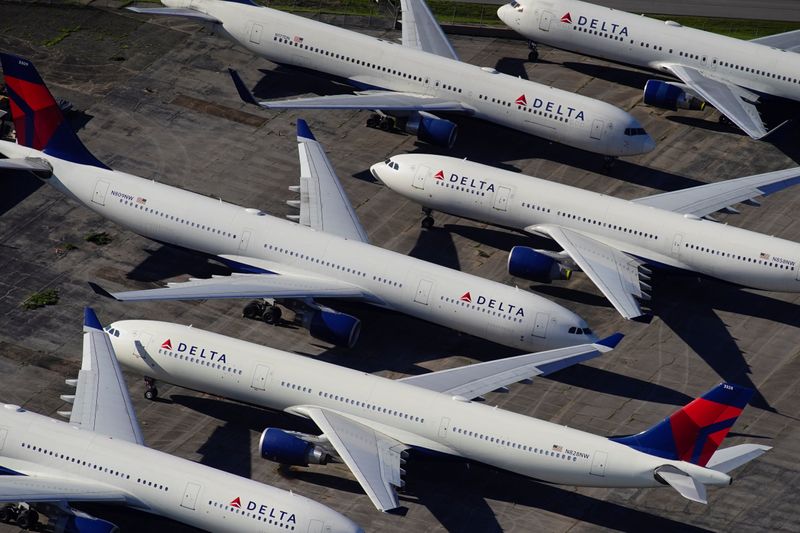By Tracy Rucinski and David Shepardson
(Reuters) - Delta Air Lines (N:DAL) moved to retire its Boeing Co (N:BA) 777 fleet and reduce its pilot ranks on Thursday as it joins other airlines wrestling with the need to shrink their operations to match reduced air travel due to the coronavirus crisis.
After announcing that it would no longer fly its 18 wide-body 777s, Delta told its 14,500 pilots that it expects to have 7,000 more than it needs in the fall, according to a memo to flight operations employees first reported by Reuters.
"I recognize that is an alarming number so it's important to know that our intent is to align staffing for what we need over the long term," John Laughter, S.V.P. of flight operations, said in the May 14 memo seen by Reuters.
U.S. airlines are collectively burning more than $10 billion in cash per month and averaging fewer than two dozen passengers per domestic flight in the wake of the coronavirus pandemic as they brace for two or three years until air travel will return to pre-crisis levels.
American Airlines Group Inc (O:AAL) has also announced a large fleet retirement, and United Airlines Holdings Inc (O:UAL) has told its pilots to brace for changes.
All three are receiving billions of dollars in government payroll aid that bans any job cuts before October.
Taking into account the exit of pilots who will reach mandatory retirement age over the next year, Delta would still have between 2,500 and 3,500 more pilots than needed to fly its schedule in the third quarter of 2021, Laughter said.
U.S. pilots must retire by age 65, a requirement that until a few months ago was fueling a rush by airlines to recruit new aviators to feed what the U.S. industry expected would be continued growth in domestic air travel.
But the spread of the novel coronavirus has brought airports around the globe to a virtual standstill, turning airlines' growth plans upside down.
Delta said it also plans to retire its older and higher- maintenance MD-90 planes by the end of the year, resulting in second-quarter non-cash impairment charges of $1.4 billion to $1.7 billion, before tax.
Shares in Delta were down 2.7% at $18.89 in late-morning trading after earlier hitting a 7-year low.
When international demand returns, Delta plans to use Airbus SE's (PA:AIR) more fuel-efficient and cost-effective A330 and A350-900 wide-body planes for long-haul flying, it said.
Few companies in the aviation industry are immune from the shake-down.
Airbus has told senior staff the company must be "resized" and is ready to cut jet production again to tackle any second wave of the coronavirus crisis, people briefed on the matter told Reuters.

Despite the grim news, President Donald Trump on Wednesday sounded an optimistic note, saying “the airline industry is in good shape," although he provided no evidence.